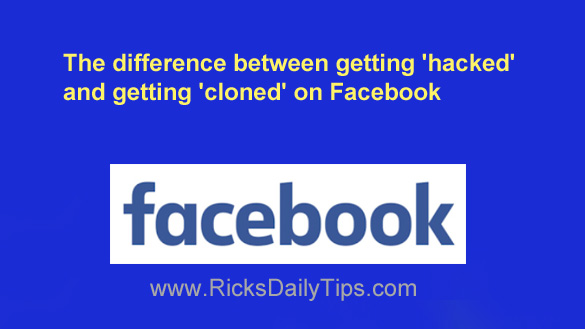 If you’ve been using Facebook for more than five minutes you’re probably well aware that hackers and scammers love targeting Facebook users with all kinds of fraudulent activities.
If you’ve been using Facebook for more than five minutes you’re probably well aware that hackers and scammers love targeting Facebook users with all kinds of fraudulent activities.
I’m sure you’ve seen an occasional “Yikes – I’ve been hacked!” post pop up in your newsfeed. In fact, you probably see them on a regular basis.
The thing is, many of the folks who believe their Facebook account has been “hacked” weren’t really hacked at all. Their accounts have actually been “cloned” – and the difference is extremely important.
While the hacking and cloning of Facebook accounts are both extremely irritating for everyone affected by the fallout, they are actually very different things and they require very different responses when one of them happens to you.
First, let’s talk about getting “hacked”…
When someone “hacks” your account they actually take control of the account itself.
Some hackers break into accounts by guessing or stealing the passwords.
Others gain access by tricking the victim into either giving them the password via a malicious link in a phishing email or installing a malicious app.
Either way, the result is the same: When someone hacks into your Facebook account he/she can do anything with the account that you can do yourself.
For example, the hacker can post on your Timeline to spam your friends with bogus offers and send them links to click for planting malware onto their own PCs.
They can also send out friend requests to people you don’t even know in order to grow your friends list and expand the pool of people they can potentially scam.
In short, having your account hacked results in the hacker “becoming you” on Facebook.
That means when your friends receive spam, nasty IMs and other garbage in their newsfeeds, it will appear that you are the culprit who is sending it out (and in a way it is, because it’s literally your account that’s sending it).
Now, lets talk about getting “cloned”…
Unlike getting hacked, your Facebook account gets “cloned” when a scammer creates a brand new account in your name.
Once the new account is created the scammer will copy the personal info that’s on your real account’s “About” page to the fake account. Next, he will download some of the photos you have posted on the real account and upload them to the fake account.
Once those tasks have been completed the scammer will post a series of status updates similar to the ones you usually post yourself, then “like” a few of the same pages that you have “liked” from your real account.
When all is said and done, the “cloned” account looks a lot like your real one. The scammer can then use the fake account to send friend requests to everyone on your real account’s friends list.
Some of your friends will be skeptical when they receive the bogus friend request and simply ignore it, but inevitably a good portion of your friends will accept it because they believe it to be legit.
Once the fake account has a few dozen of your friends aboard, the scammer will send friend requests to people you don’t even know to fill up the fake account’s friends list (which of course expands the pool of potential scam victims).
The important thing to understand is that when your Facebook account gets cloned, it has not been hacked. The scammer never has actual control of your real account and he cannot use it to do anything other than read your posts and look at your photos.
Now that you understand the difference between having your account “hacked” and having it “cloned”, you need to know what to do to if one of them ever happens to you.
As in sports, the best defense is a good offense when it comes to protecting your Facebook account from hackers. It’s actually a lot easier to prevent a successful hack on your account than it is to clean up the mess after a hack takes place.
This post discusses several things you can do to prevent your Facebook account from getting hacked.
While there are steps you can take to prevent your account from getting hacked, there is really very little you can do to prevent a scammer from cloning your account.
Setting the default privacy level of pretty much everything on your account to “Friends Only” will limit the number of people who can read your posts and the info on your “About” page and view your photos. That simple settings change would make it a lot less likely that a potential hacker would have access to enough of your info to successfully clone your account.
Also, hiding your friends list from the public will also help prevent your account from getting cloned since a potential scammer won’t be able to see your friends or even know how many friends you have.
That’s all there is to it. Now you’ll be able to tell when someone has hacked or cloned your Facebook account (and which one it is).